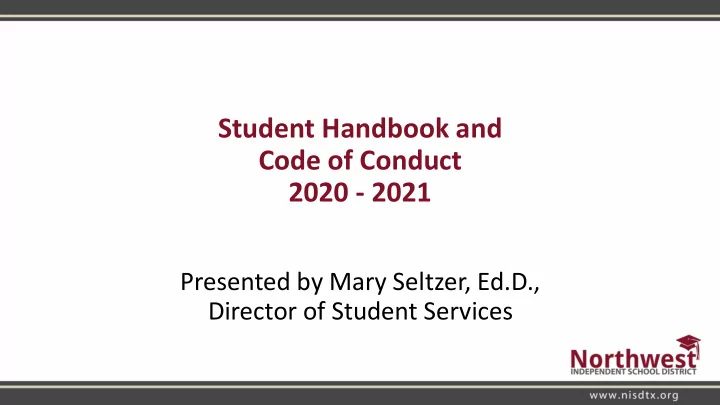

Student Handbook and Code of Conduct 2020 - 2021 Presented by Mary Seltzer, Ed.D., Director of Student Services
STUDENT CODE OF CONDUCT CHANGES Vaping / Tobacco Intervention • Add additional wording to Code of Conduct to address distribution and selling of tobacco, e- cigarette, vape pen, e-vaporizer, dab pen, JUUL, liquid cartridges or any other device used to inhale an aerosol.
STUDENT HANDBOOK CHANGES Consent to Conduct a Psychological Evaluation • The district has established procedures for providing a parent with a recommendation for an intervention for a student with early signs of mental health concerns or substance abuse or who has been identified as at the risk of attempting suicide. The district will notify the student’s parents within a reasonable amount of time after learning that a student has displayed early warning signs and a possible need for intervention and provide information about available counseling options.
STUDENT HANDBOOK CHANGES Viewing Surveys • A parent may inspect protected information surveys of students and surveys created by a third party, instruments used to collect personal information from students for any of the above marketing, sales or other distribution purposes; and instructional material used as a part of the educational curriculum.
STUDENT HANDBOOK CHANGES Safety Transfers/Assignments • The board or its designee will honor a parent’s request to transfer his or her child to another classroom or campus if the district has determined that the child has been a victim of bullying, including cyberbullying, as defined by Education Code 37.0832. The board may transfer a student who has engaged in bullying to another classroom. The board will consult with the parent of a child who has engaged in bullying before deciding to transfer the student to another campus.
STUDENT HANDBOOK CHANGES Trafficking (Sex and Labor) • Added specific new warning signs for sex and labor trafficking of children.
STUDENT HANDBOOK CHANGES Counseling • The district has a comprehensive school counseling program - specific details are shared in the proposed handbook. These are not new systems to NISD but are now listed specifically in the handbook.
STUDENT HANDBOOK CHANGES Foundation Graduation Program • A student is not required to complete an Algebra II course to graduate under the foundation graduation program, and the district will annually notify a student’s parents of this fact.
STUDENT HANDBOOK CHANGES Mental Health Support • The proposed handbook has been reorganized to align with the TASB model. This includes a new section heading for Mental Health Support. This includes describing how the district addresses mental health, behavioral health, and substance abuse concerns.
STUDENT HANDBOOK CHANGES Athletics Participation • The proposed handbook has been updated to align with UIL’s recommendations for certification from an authorized health-care provider. • The examination is required in the first year of middle school competition. During alternate years, the student must complete a medical appraisal form, and the results of this appraisal may prompt the district to require a physical examination.
STUDENT HANDBOOK CHANGES Health-Related Resources, Policies, and Procedures. • The proposed handbook has been reorganized to align with the TASB model. This includes a new section on Health-Related Resources, Policies, and Procedures.
STUDENT HANDBOOK CHANGES Law Enforcement Agencies • When law enforcement officers or other lawful authorities wish to question or interview a student at school, the principal or principal's designee will cooperate fully regarding the conditions of the interview, including without parental consent, if necessary , if the questioning or interview is part of a child abuse investigation.
STUDENT HANDBOOK CHANGES Parking and Permits (Secondary Grade Levels Only) • The proposed handbook specifically outlines the process for applying for parking permits for students.
STUDENT HANDBOOK CHANGES Preparedness Training: CPR and Stop the Bleed • The district will annually offer instruction in CPR at least once to students enrolled in grades 7-12. The instruction can be provided as part of any course and is not required to result in CPR certification. • The district will annually offer students in grades 7-12 instruction on the use of bleeding control stations to respond to a traumatic injury.
Questions
Recommend
More recommend